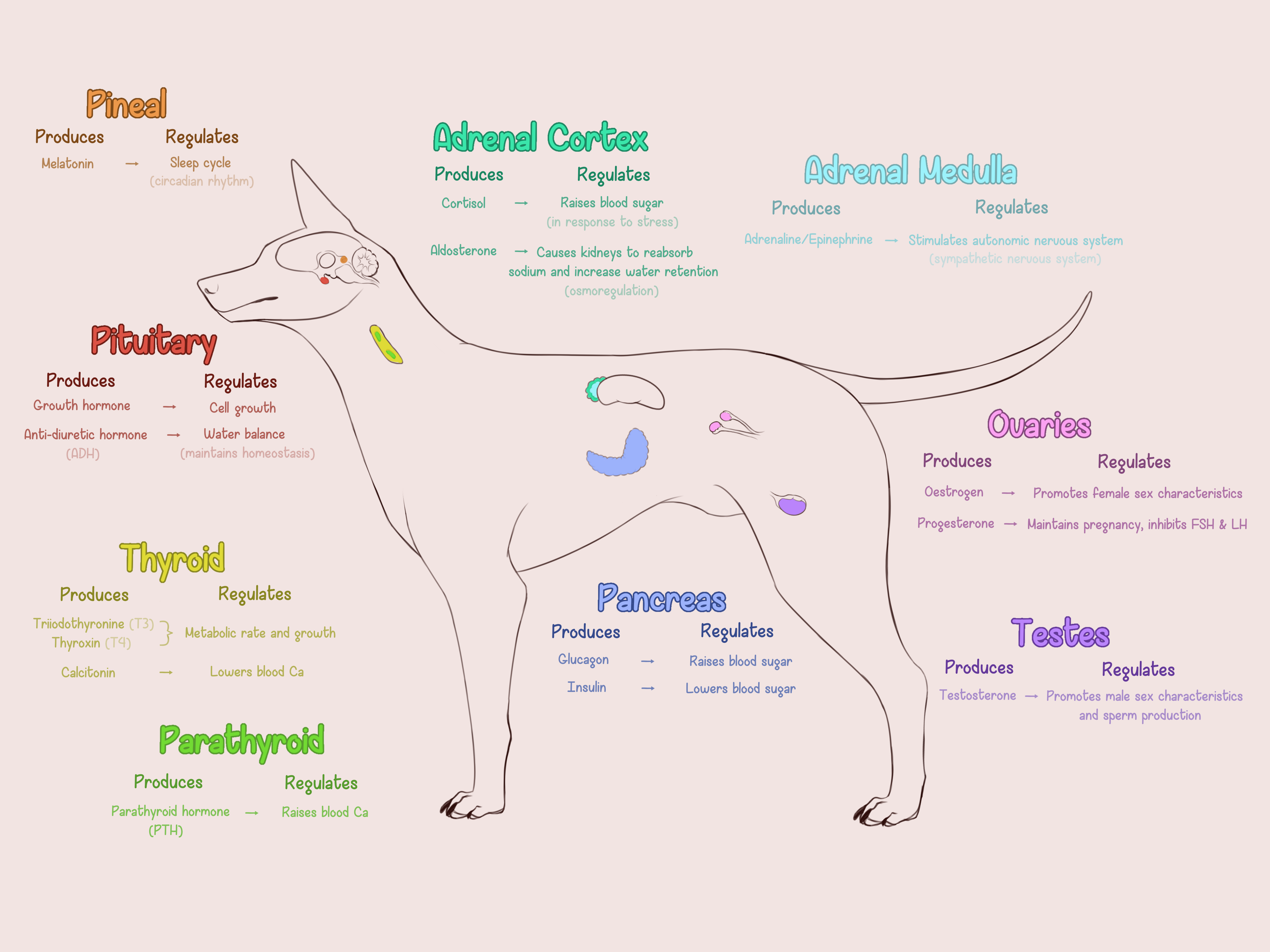-
What is the endocrine system?
A messenger system consisting of organs in the body that produce hormones.
-
What does the endocrine system help regulate?
Metabolism, growth and development, tissue function, and emotion.
-
What is a gland? What does it do?
An organ that sends out messages in the endocrine system. It releases hormones that either travel through the whole body (circulating) or effect one area (locally acting)
-
What do hormones do?
Diffuse throughout the body. They are either locally acting or circulate through the entire body.
-
What does the pineal gland do?
Secretes melatonin (at night). Helps with circardian rhythm and influences sexual development and breeding cycles.
-
What does the pituitary gland do?
Influences other organs and produces several hormones.
-
What does the anterior pituitary mainly do?
MAINLY produces growth hormones which help to maintain healthy muscle and bone mass and causes cell growth.
-
What hormones does the anterior pituitary produce?
Growth hormone, Prolactin (initiates milk production), Adrenocorticotrophic (supports cortisol production, reduces stress, maintains blood pressure), Thyroid-stimulating hormone (stimulates thyroid gland to produce hormones which regulate metabolism), Luteinizing hormone, Follicle-stimulating hormone (FSH) (takes part in development of ova)
-
What does the posterior pituitary do?
Produces oxytocin and antidiuretic hormone (ADH), aiding in parturition contractions (during birthing) and regulating water balance to maintain homeostasis.
-
What does the thyroid do?
Produces thyroxine which influences growth and development in young animals (also regulates oxygen in cells and effects metabolism) and produces calcitonin which stimulates calcium absorption in bones (lowering blood Ca).
-
What does the parathyroid do?
Produces parathyroid hormone (PTH) which regulates blood calcium & phosphorous levels. If calcium levels fall too low, it raises the blood calcium levels (raising blood Ca).
-
What does the pancreas do?
Produces hormones that regulate blood glucose levels in a process called glucoregulation. (also produces enzymes which aid digestion)
Insulin = lowers | Glucagon = raises
-
What does the adrenal cortex do?
Produces corticesteroids such as cortisol, which is released in response to stress or low levels of blood glucose. It increases blood sugar levels and suppresses the immune system.
It also produces aldosterone, which contributes to osmoregulation, balancing salt and water in the blood by causing the kidneys to reabsorb sodium and increase water retention.
-
What does the adrenal medulla do?
Produces catecholamines such as adrenalin (epinephrine) which forms part of an animal's 'fight or flight' response. Adrenalin increases heart rate, blood pressure and dilates air passages which helps the animal flee or face the threat.
-
What do the adrenal glands do?
Promote cardiovascular function, prepare the body for emergencies, help distribute stored fat, and produce cortisone and hydrocortisone that affect glucose, protein and fat metabolism.
-
What do the ovaries do?
Produce oestrogen and progesterone which aid in the development of secondary sex characteristics (ie: mammary glands), prepare the uterus for pregnancy, and maintains pregnancy stopping the animal coming into heat whilst gestating.
-
What do the testes do?
Produce testosterone which aids the development of secondary sex characteristics (ie: facial hair in humans), and promotes the production of sperm.
-
What does the thymus do?
Aids in the development of a healthy immune system.
-
What is the thymus?
An endocrine gland, involved in the development of T-Lymphocytes, which is more closely linked with the lymphatic system.


